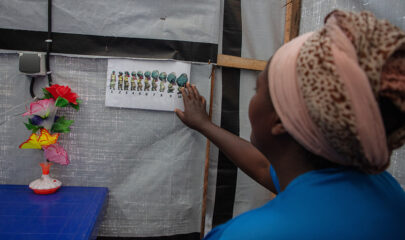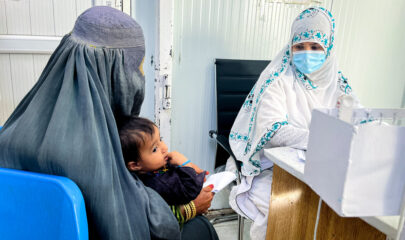The COVID-19 pandemic is disproportionately impacting the world’s most vulnerable. Among them are more than 70 million forcibly displaced people worldwide – refugees, asylum seekers, internally displaced people (IDPs) – as well as migrant workers, including undocumented migrants.
Many of these men, women and children live in formal and informal camps, reception centres or in detention centres. Others live on the streets in informal housing arrangements. Most lack access to basic services such as clean water, sanitation or healthcare and many don’t have legal status.
COVID-19 PANDEMIC EXACERBATES AND IS EXACERBATED BY POOR LIVING CONDITIONS
In these settings, preventative measures are often not possible. How can we ask people to protect themselves when they do not have easy access to water or soap? Or self-isolate when they live in cramped tents side by side with 10 other people?
Physical distancing is very difficult, if not impossible, in overcrowded camps and dense urban settings. Having to line up for water and food increases the risks of contamination.
In many contexts, displaced people live in insecurity, facing risk of arrest or abuse and may be stigmatized as ‘disease carriers’ against a backdrop of increased xenophobia and limited access to reliable information. People in these circumstances are sometimes fully dependent on humanitarian aid. In many areas, such assistance is limited.
Moreover, in many places, the pandemic is being used as an excuse to punish people on the move, and those that seek to care for them. At least 167 states have fully or partially closed their borders to contain the spread of COVID-19; 57 make no exception for people seeking asylum (UNHCR).
WHAT CAN WE DO TO PROTECT THESE ESPECIALLY VULNERABLE PEOPLE?
We must make sure COVID-19 is not used by governments as an excuse to enforce deadly migration control policies.
We understand the serious challenges presented by COVID-19 but safeguarding the wellbeing of those in your own country and upholding your international obligations towards refugees, asylum seekers and migrants are not mutually exclusive principles.
We need to ensure human rights are respected. Governments must not use the COVID-19 emergency public health measures to target refugees, asylum seekers and migrants. All restrictions on rights must be strictly necessary, based on scientific evidence and not applied arbitrarily or discriminatorily.
Quarantine and lockdown measures should be applied equally to all without discrimination; healthcare, social and psychosocial support and basic needs like food, water and other essentials should be provided to those in quarantine; and mass quarantine should be avoided where possible. Forcing people to live in overcrowded and unhygienic camps was always irresponsible but is even more so now than ever, due to the COVID 19 threat.
Vulnerable refugees, asylum seekers and migrants should be evacuated whenever possible. In Greece, on the island hotspots, MSF is calling for the evacuation of people the most at risk (people above 60 years and those with respiratory conditions, diabetes, or other health complications) as well as continuing efforts to decongest the camps, including relocating unaccompanied minors and sick children to other EU member states. In Libya, MSF is calling for the international community and the European governments to put in place direct humanitarian evacuation corridors for the most vulnerable displaced people exposed to the most imminent life threatening risks.
COVID-19 control measures should not come at the cost of access to urgently needed healthcare. This means border closures must not stop urgently needed medical and humanitarian supplies or staff from coming into countries.
Bangladesh: Dense and overcrowded camps

One of the most densely populated countries in the world, Bangladesh also houses the world’s largest refugee camp in Cox’s Bazar. Here, nearly one million Rohingya refugees live in overcrowded, unsanitary conditions.
MSF has set up isolation wards in our medical facilities in Cox’s Bazar, where teams treat patients who are COVID-19-positive and monitor others with suspected COVID-19 in isolation. Staff are working hard to treat all of our patients and ensure we can provide the best possible care for COVID-19 and other medical conditions, as well as continuing to work together with the Bangladeshi authorities, the World Health Organization and other health agencies to limit the spread of the virus. Our teams are also carrying out health promotion activities in the camps. Regular activities in the Rohingya refugee camp in Cox’s Bazar are ongoing.
Libya: Crisis within a crisis
Our activities in Libya have been impacted by the restrictions and limitations imposed by the COVID-19 response and the escalation of the ongoing conflict. At the same time, these factors are a reason for increased humanitarian needs in the country. MSF is committed to supporting people most in need in Libya and has intensified efforts to support the national health system to cope with the pandemic.
IN TRIPOLI, OUR TEAMS:
- provide medical and humanitarian assistance to migrants and refugees in detention
- offer humanitarian assistance to migrants and refugees living in urban settings
- conduct COVID-19-related training on infection prevention and control, treatment and awareness-raising in multiple hospitals and primary healthcare centres
IN MISRATA AND THE CENTRAL REGION, OUR TEAMS:
- provide basic healthcare, psychosocial support and protection monitoring
- distribute nutrition supplements and hygiene kits to refugees and migrants arbitrarily held in detention centres
- provide first aid and distribute non-food items such as blankets for people attempting to leave for Europe
- provide healthcare and medical referrals to migrants who escaped captivity and survivors of torture and trafficking
- provide COVID-19-related training to medical staff as well as reinforcing infection prevention and control measures in detention centres


